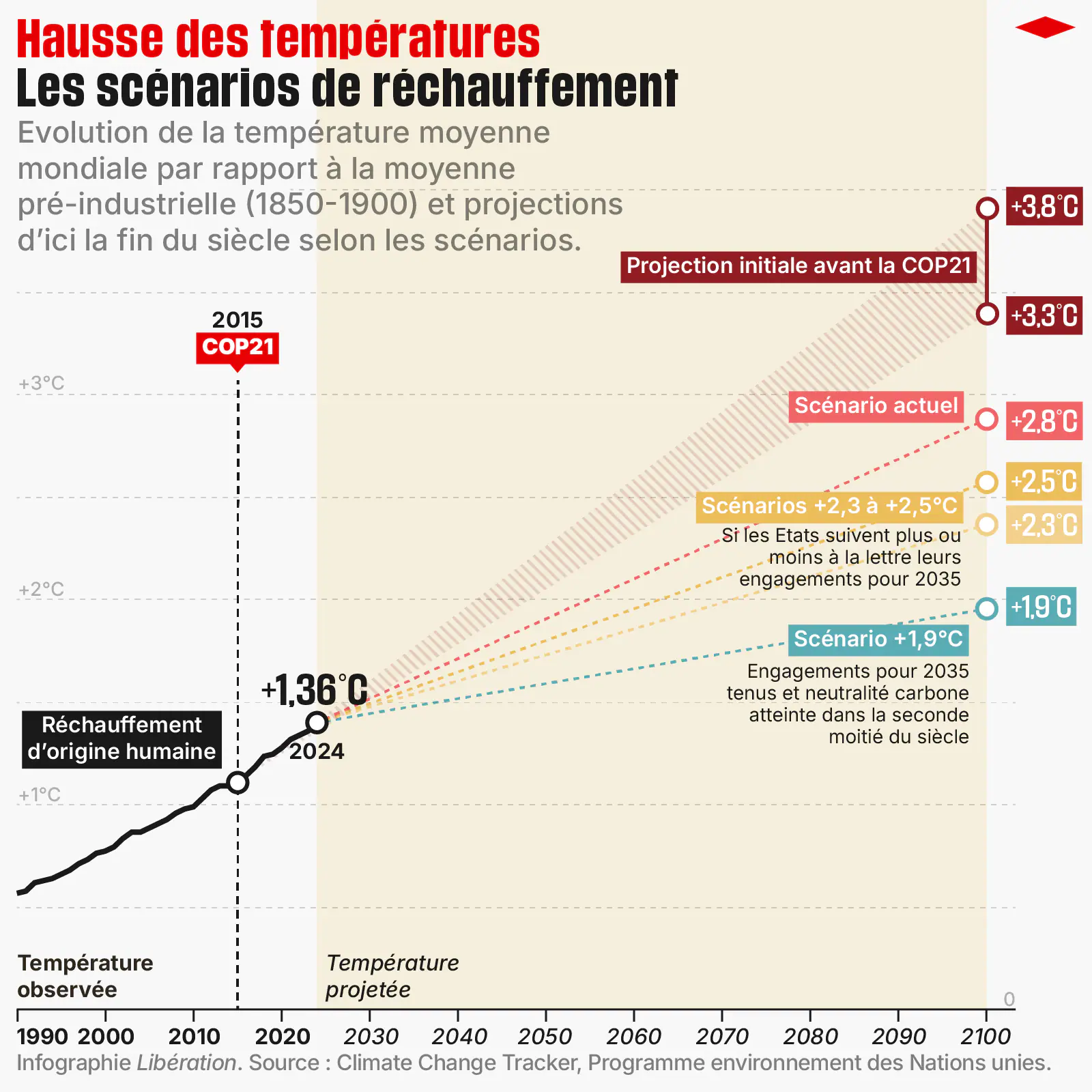Le climat est la distribution statistique des conditions de l’atmosphère terrestre dans une région donnée pendant une période donnée. L’étude du climat est la climatologie. Elle se distingue de la météorologie qui désigne l’étude du temps dans l’atmosphère à court terme et dans des zones ponctuelles. source : wikipedia
COPERNICUS – Mises à jour

Les champs auteur(e)s & mots-clés sont cliquables. Pour revenir à la page, utilisez le bouton refresh ci-dessous.
filtre:
collapse
I know it’s almost impossible to turn your eyes away from the Trump show, but that’s the point. His antics, ever-grosser and more preposterous, are designed to keep him in our minds, to crowd out other issues. His insatiable craving for attention is a global-threat multiplier. You can’t help wondering whether there’s anything he wouldn’t do to dominate the headlines.
States and financial bodies using modelling that ignores shocks from extreme weather and climate tipping points
Ecosystem destruction will increase food shortages, disorder and mass migration, with effects already being felt
Global biodiversity loss, ecosystem collapse and national security - A national security assessment
Notre ami Luke Kemp, chercheur au Centre pour l'étude du risque existentiel à l'Université de Cambridge (UK), a publié le livre Goliath’s Curse, the History and Future of Societal Collapse (Penguin, July 2025, 580 pages), qui sera édité en français par Albin Michel au printemps 2026. Cette « malédiction de Goliath » est le meilleur livre sur l’effondrement systémique mondial depuis dix ans, tant par la vision multidisciplinaire qu’il présente que par sa complétude et par son érudition.
Mon essai précédent explorait pourquoi certaines personnes perçoivent l’effondrement plus tôt que d’autres. Celui-ci pose une autre question : si l’effondrement ne peut pas être évité, à quoi sert réellement une prise de conscience précoce ?
Perception, pattern-seeking, and the role of neurodivergence in a failing civilisation
Glacial earthquakes are a special type of earthquake generated in cold, icy regions. First discovered in the northern hemisphere more than 20 years ago, these quakes occur when huge chunks of ice fall from glaciers into the sea. Until now, only a very few have been found in the Antarctic. In a new study soon to be published in Geophysical Research Letters, I present evidence for hundreds of these quakes in Antarctica between 2010 and 2023, mostly at the ocean end of the Thwaites Glacier – the so-called Doomsday Glacier that could send sea levels rising rapidly if it were to collapse.
UN GEO report says ending this harm key to global transformation required ‘before collapse becomes inevitable’
The global collapse arrives piecemeal. Germany is going first.
Je dis toujours que les modèles ne sont pas des prédictions, mais des illustrations qualitatives de ce que pourrait être l’avenir. Cependant, à mesure que l’avenir se rapproche du présent, les modèles peuvent commencer à être considérés comme des outils prédictifs. Il s’agit de la dichotomie entre météo et climat, si habilement exploitée par les politiciens pour semer la confusion dans les débats sur le climat. À l’heure actuelle, nous nous rapprochons du point où nous pourrions prévoir un effondrement de la même manière que nous pouvons prévoir la trajectoire d’une tempête tropicale.
I always say that models are not predictions; they are qualitative illustrations of what the future could be. But as the future gets closer to the present, models can start being seen as predictive tools. It is the weather/climate dichotomy, so aptly exploited to confuse matters by politically minded people in the discussion about climate. Right now, we are getting close to the point that we could forecast a collapse in the same way as we can forecast the trajectory of a tropical storm. So, you remember how “The Limits to Growth” generated a long term forecast in 1972. Here it is
The reality of coming to terms with the end of industrial civilisation
Luke is a research associate at the Centre for the Study of Existential Risk at the University of Cambridge, and has spent the past five years studying the collapse of civilisations throughout history. He joins me to explain his research, detailing the difference between complex, collective civilisations and what he calls “Goliaths”, massive centralising forces by which a small group of individuals extract wealth from the rest through domination and the threat of violence. Today, he says, we live in a global Goliath. In this astounding conversation, Luke takes us from the Ancient times to the modern day, revealing the root causes of collapse and paralleling them what we’re living through today. He explains the egalitarian nature of our species, and shines new light on what a future could look like free from today’s global Goliath. He reminds us all that we tend to view collapse through the eyes of the 1%, those who have the most to lose, and gives startling accounts of how populations bounced back after thei
Collapse has historically benefited the 99%. […] That’s the amazing conclusion of Luke Kemp, author of Goliath’s Curse: The History and Future of Societal Collapse. Luke is a research associate at the Centre for the Study of Existential Risk at the University of Cambridge, and has spent the past five years studying the collapse of civilisations throughout history. He joins me to explain his research, detailing the difference between complex, collective civilisations and what he calls “Goliaths”, massive centralising forces by which a small group of individuals extract wealth from the rest through domination and the threat of violence. Today, he says, we live in a global Goliath.
Scientists say ‘shocking’ discovery shows rapid cuts in carbon emissions are needed to avoid catastrophic fallout
Several, more recent global warming projections in the coupled model intercomparison project 6 contain extensions beyond year 2100–2300/2500. The Atlantic meridional overturning circulation (AMOC) in these projections shows transitions to extremely weak overturning below the surface mixed layer (<6 Sv; 1 Sv = 106 m3 s−1) in all models forced by a high-emission (SSP585) scenario and sometimes also forced by an intermediate- (SSP245) and low-emission (SSP126) scenario. These extremely weak overturning states are characterised by a shallow maximum overturning at depths less than 200 m and a shutdown of the circulation associated with North Atlantic deep water formation. Northward Atlantic heat transport at 26°N decreases to 20%–40% of the current observed value. Heat release to the atmosphere north of 45°N weakens to less than 20% of its present-day value and in some models completely vanishes, leading to strong cooling in the subpolar North Atlantic and Northwest Europe. In all cases, these transitions to a
The Atlantic meridional overturning circulation (AMOC) is an important tipping element in the climate system. There is a large uncertainty whether the AMOC will start to collapse during the century under future climate change, as this requires long climate model simulations which are not always available. Here, we analyze targeted climate model simulations done with the Community Earth System Model (CESM) with the aim to develop a physics-based indicator for the onset of an AMOC tipping event. This indicator is diagnosed from the surface buoyancy fluxes over the North Atlantic Ocean and is performing successfully under quasi-equilibrium freshwater forcing, freshwater pulse forcing, climate change scenarios, and for different climate models. An analysis consisting of 25 different climate models shows that the AMOC could begin to collapse by 2063 (from 2026 to 2095, to percentiles) under an intermediate emission scenario (SSP2-4.5), or by 2055 (from 2023 to 2076, to percentiles) under a high-end emission scenar
This is not a call to despair, but an invitation to understand the forces driving the process of collapse, and to explore how we might navigate the descent with integrity, purpose, and care for the living world.
Que se passe-t-il lorsque les masses prennent conscience de l’effondrement ? L’illusion collective et le réconfort du déni La société s’accroche à des illusions réconfortantes face au destin funeste. L’histoire offre des exemples qui donnent à réfléchir. Les psychologues décrivent le « biais de normalité », c’est-à-dire notre tendance à sous-estimer les menaces et à continuer comme si de rien n’était.

![]()
![]()





